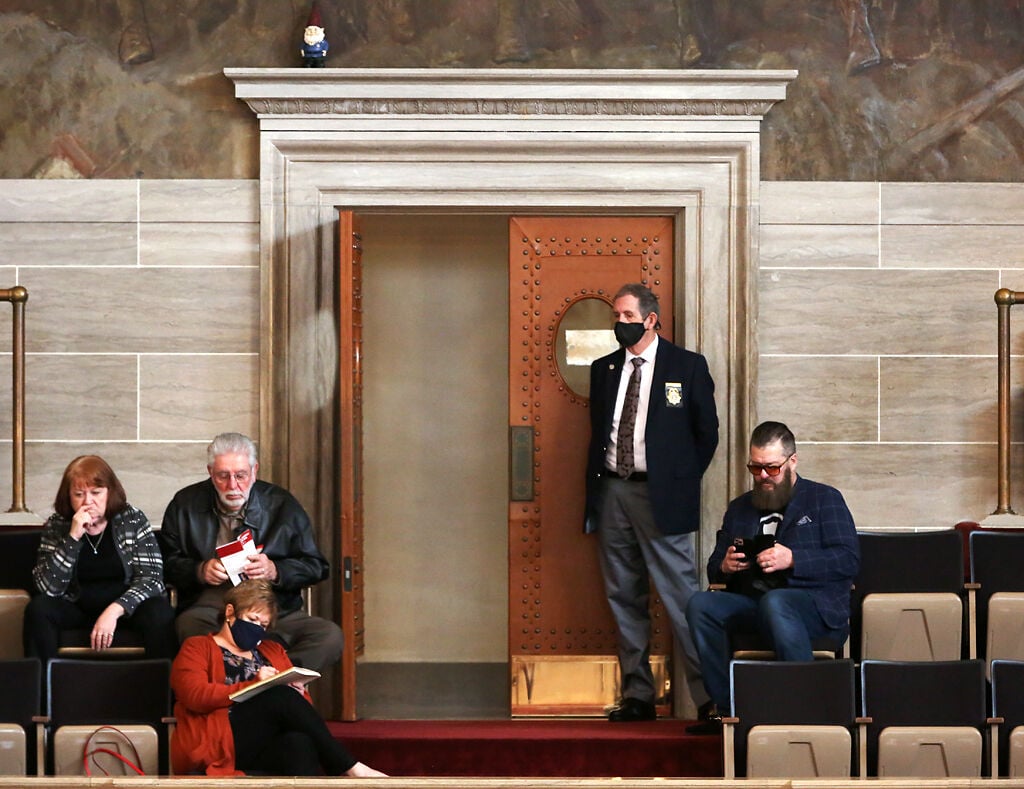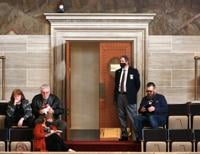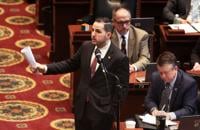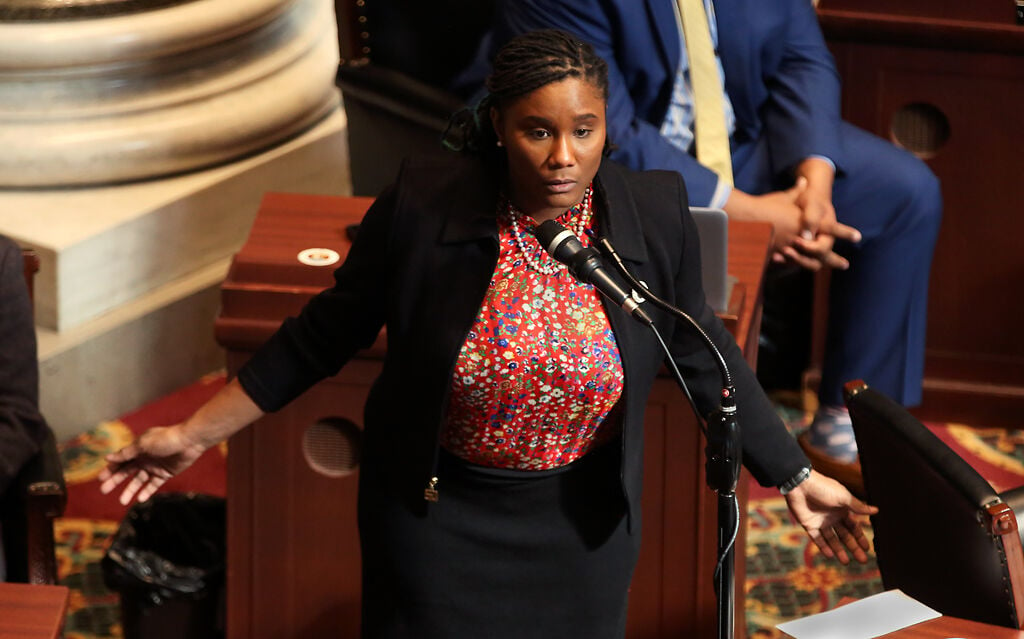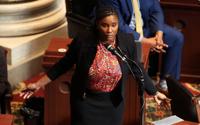Wednesday, March 31, 2021
MNEA Endorses David Tyson Smith for H. D. 45!
Wednesday, March 17, 2021
Support OUR CMNEA 2021 School Board Candidates
CMNEA Members!
Sunday, February 28, 2021
Charter School Expansion Debated in MO
Charter school expansion, 'school choice' scholarships divide lawmakers
- BY CAITLIN R. KING AND ADAM SATRYA JACKSON
Spectators sit in the Missouri House of Representatives gallery Wednesday at the Capitol in Jefferson City. The floor debate, regarding aspects of House Bill 349, lasted for two hours.
Representative Peter Merideth, D-St. Louis, participates in the floor debate on House Bill 349 Wednesday at the Capitol in Jefferson City. During the floor debate, Merideth raised questions regarding the state budget and transportation for kids who choose to attend a private school through the program House Bill 349 would create.
Representative Phil Christofanelli, R-St. Peters, answers questions regarding House Bill 349 Wednesday at the Capitol in Jefferson City. The bill, sponsored by Christofanelli, would create a scholarship program to send children to private schools.
Representative Raychel Proudie, D-Ferguson, speaks on House Bill 349, a “school choice” bill Wednesday at the Capitol in Jefferson City. “If it’s not good enough for your kids, it’s not good enough for mine,” Proudie said in her address on the House floor. “Stop using poor kids and Black kids for experimentation.”
JEFFERSON CITY — Senate Bill 55 is chock-full of contentious education measures.
The subject of a debate that lasted until about 2 a.m. Wednesday, the bill tackles charter schools and “school choice,” teaching the Bible in public classrooms and criminalizing the teaching of sex education without parents’ written permission.
Current legislation only allows charter schools in Kansas City and St. Louis. If passed, this bill would allow them to operate “in any municipality with a population greater than thirty thousand.”
For the past five years, Missouri lawmakers have tried to expand charter schools in the state. Because of the population provision, they may have a shot. Many conservative rural lawmakers have opposed charter expansion because their school districts don’t want it, but the population cap would exempt them.
Under the legislation, another 20 Missouri cities, or 58 school districts, meet that threshold and could potentially see a charter school open.
A major criticism of charter schools is their potential to pull money away from public schools if enough students were pulled out and sent to the charters. A portion of school funding is appropriated based on the number of students enrolled. The fiscal note for the bill states that public schools will report a negative impact if this legislation were passed.
When asked about these concerns, Sen. Caleb Rowden, R-Columbia, said that “the notion that charters take money from public education is a flawed notion. … I don’t think (opponents of charter schools) are being entirely honest about what the actual ramifications are.”
Sen. Lincoln Hough, R-Springfield, disagrees. “I don’t believe in the model of a statewide charter school expansion, where a district in my community of Springfield has no say if these entities, ... often times for-profit institutions, come in.”
Along with charter school expansion, the bill also establishes the Missouri Empowerment Scholarship Accounts Program. Taxpayers would be allowed to donate to the ESA and receive a tax credit for their trouble. Students who qualify for support from the fund could receive up to $6,375 a year to attend schools outside of their district.
To qualify, students must be Missouri residents and have attended a public school full time for at least one semester. K-12 students up to 21 years old could qualify. Students enrolled in charter schools would not qualify.
The bill has expanded to include more than support for “school choice” issues.
In a narrow vote, senators agreed to add an amendment that would require schools to notify all parents that sex education would be taught and would require the parents’ written permission that their child could participate. If a school were to fail to get that written permission, they would be charged with a Class C misdemeanor.
For Sen. Andrew Koenig, R-Manchester, the criminalization “will have to change. It creates a crime. I think there are major problems with that piece of the bill.”
Another element of the bill is that it would allow Bible courses to be taught as an elective in public schools. Specifically, the bill only includes “the Hebrew Scriptures, the Old Testament of the Bible and the New Testament of the Bible.”
Lawmakers have tried to pass similar legislation for the past two years, without success.
Previous Missourian reporting on a similar bill from 2019 said that a resolution allowing the teaching of the Bible sought to clarify provisions of the 1963 U.S. Supreme Court decision in Abington v. Schempp, which bars public schools from facilitating Bible readings. But the ruling did not prohibit the “study of the Bible or of religion, when presented objectively as part of a secular program of education.”
In regard to the Bible portion of the bill, Koenig said, “It’s fine that it’s in there, but I don’t know that it’s 100% necessary.” Senate leaders have said they plan to revisit the bill no later than Monday.
Meanwhile, emotions erupted among Missouri House lawmakers over a contentious bill calling for “school-choice” expansion through ESAs.
House Bill 349 — sponsored by Rep. Phil Christofanelli, R-St. Peters —would allow families to apply for a state-supported scholarship, known as an education savings account, to send their kids to private school. The House narrowly gave initial approval to the bill.
The proposal to establish the “Missouri Empowerment Scholarships Account Program” continues long-standing efforts among Republican lawmakers to expand so-called school choice legislation in Missouri.
Christofanelli said the move, while “not a silver bullet,” is a “lifeline for children at failing schools.”
“If you are a person of means, you can send your child to the school of your choosing,” he said. “But if you do not have those means, you do not have school choice — and that’s what this bill tries to rectify.”
The education savings account bill would operate similarly to other ESAs in states around the country.
A taxpayer can make a contribution to an approved education assistance organization, which are nonprofits tasked with managing education savings accounts. Then the contributor will receive a tax credit equal to 50% of the donation, which then can be deducted from one’s tax liability for that year. If passed, the total amount of tax credits distributed to donors would not exceed $50 million in the first year, with a hard cap of $75 million.
Both sides debating agreed that COVID-19 and the myriad of obstacles schools have faced has illuminated issues within Missouri’s public school system, but some — including some Republicans — raised concerns about the lack of accountability standards and draining resources from public schools.
Rep. Raychel Proudie, D-Ferguson, passionately opposed the bill, referring to it as “trash” and asserted that she could benefit if she wanted to. She said the legislature should focus on housing discrimination instead.
“This bill helps me in my purse, but it’s not about me and my purse; it’s about doing the right thing,” she said. She took issue with the idea that most rural districts are exempt. “If it’s not good enough for your kids, it’s not good enough for mine, so stop using poor kids and Black kids to experiment on.”
Rep. Maggie Nurrenbern, D-Kansas City, said she wouldn’t support the bill because she doesn’t believe lawmakers should be diverting public funds to private schools.
Rep. Peter Meredith, D-St. Louis, said the tax credits would strain the state’s budget and drain general revenue. “Fifty million dollars of it is going to subsidize private education in cities.”
Bill to Recall Locally Elected School Board Members
Lawmakers push to allow recall of school board members
- BY WICKER PERLIS
JEFFERSON CITY — A bill allowing for the recall of local school board members was inspired by Columbia Public Schools.
State Rep. Chuck Basye, R-Rocheport, presented the bill Tuesday to the House Elementary and Secondary Education Committee.
Basye did not hide the fact that parents’ disdain for CPS had inspired the bill.
“To be totally honest, initially it was” targeted at CPS, Basye said. “I agreed to carry this on behalf of those parents.”
However, since work on the bill began last year, Basye, who represents part of Columbia, has heard similar concerns from parents in other districts. Parents are especially critical of their school boards’ reactions to the COVID-19 pandemic, he said.
Rep. Ian Mackey, D-St. Louis, has criticized CPS in the past. But Mackey said that he was unsure if he could support the bill. His main point of contention was that, with board member terms only being three years, recalls may be carried out hastily or be politically motivated. One concern was that a losing candidate would immediately begin a recall campaign against the winner.
“The timeline and the cost right now just don’t make sense to me, though I understand the intent,” Mackey said.
Basye said he believed the requirements for a recall — gathering signatures totaling at least 25% of votes in the last school board election — is high enough to prevent members from being recalled for unjustified reasons. The bill would also prevent board members from being recalled within 30 days of taking office and 180 days before the end of a term.
“It’s going to take an awful lot of work to recall someone,” Basye said.
Rep. Maggie Nurrenbern, D-Kansas City, questioned whether 30 days was long enough.
“They could be recalled after their first meeting,” Nurrenbern said.
Basye made clear he did not think being on the school board was a simple job.
“I know the school board is trying to do the right thing, and I’m not targeting any member,” Basye said. “It’s a tough job, and they don’t get paid, so I really feel for them, but I feel this is an appropriate bill.”
The Missouri School Board Association opposed the bill.
CMNEA School Board Forum
Systemic racism and LGBTQ+ community key at School Board candidate forum
Five candidates for the Columbia School Board discussed diversity, equity and the superintendent at a Thursday evening forum hosted by the Columbia Missouri National Education Association.
Teresa Maledy is the only incumbent in the race, facing candidates Lucas Neal, Aron Saylor, Katherine Sasser and Jeanne Snodgrass for two open seats in the coming election on April 6.
Cortni Gonzalez, a math teacher at Hickman High School, and Shelli Thelen, a third-grade teacher at Paxton Keely Elementary School, moderated the forum, which was livestreamed to 100 viewers via Zoom.
Gonzalez asked the five candidates a question she believed would "rock the boat."
"How will you as a School Board member actively retain and then recruit teachers of color for CPS?" she asked.
Maledy, who applauded a current program through local colleges called "Grow Your Own," said it was important to understand why teachers of color are leaving.
Neal, who noted his mother’s career in the district and his involvement in Young Life, mentioned a program that gives scholarships to high school students toward an education degree. He said he wants to put more effort into the program and look inward toward the district.
While Maledy and Neal approached their answers by backing current efforts, Sasser, the only candidate who has taught in Columbia Public Schools, responded with the following:
"As five white people running for School Board, the first thing we need to say is that we need to address systemic racism," Sasser said. "We need to address the fact that our system has been built for white people. And that includes oppression for Black teachers and other teachers of color — in particular those teachers of color in intersectional spaces."
"How are we making it difficult for you to continue to do your job as a person of color in this district?" she added.
Sasser then presented information that she collected from teachers of color who previously spoke with her. She mentioned microaggressions, a lack of support in comparison with white teachers and challenging workloads.
Both Saylor and Neal also mentioned finding people who are transitioning to a second career and recruiting them more directly.
The moderators then asked how the district can support LGBTQ+ students, families and staff members.
Neal said the district needs to continue to provide training for teachers so classrooms can be accepting spaces for every child. He added that teachers who defy that acceptance should be reprimanded.
Snodgrass, who currently has children in elementary school, middle school and high school, distanced herself from previous answers made by Maledy, Neal and Saylor and instead focused on policy implementation.
"It's important that there are changes to the systems so that those students understand that their dignity as a person, just as they are, is being respected and supported," she said. "We know that there are much higher rates of suicide for students and for others that identify as LGBTQ."
She mentioned changes such as preferred names on legal forms, using terms like "guardian" instead of "mother" and "father" and providing nongendered physical education.
Sasser, who has a child who identifies in the LGBTQ+ community, said this question was very personal. Although her daughter has struggled to get support, some teachers have learned and adjusted.
In order to improve, the district must have more representation in its staff and implement a human development curriculum that centers around all experiences, Sasser said.
The moderators also posed this question: “What qualifications do you think our next superintendent should possess to meet the needs of our community?”
Neal said that he would like a superintendent who has done the job before.
Saylor and Snodgrass added that the next superintendent must be able to communicate, be transparent and collaborate with teachers.
Sasser addressed the question from a teacher’s perspective.
"Our superintendent … has to have a proven record of transformational equity work in their background," she said. "Not just be able to say the buzzwords."
Gonzalez also asked what programs need more funding and what cuts should be made.
All five candidates said they understand the crucial decisions of budgeting and the importance of funding early education programs. They all suggested that the School Board analyze the current allocation of finances and identify programs that are not currently serving students.
"We've lost 800 students, which is a major loss of funding from the state of Missouri," Neal said in reference to the pandemic. "One of our first priorities should be to restore confidence in our schools and hopefully gain back trust in the community."
He argued that the best option was to turn to the district’s chief financial officer, Heather McArthur.
Snodgrass noted that the community and the School Board must prioritize and support programs for students who have been underserved and underrepresented.
"If you can raise them up, you raise up the quality for everybody," she said.
CMNEA will announce its endorsement for School Board during the week of March 8.
Bill Could Take Governor Appointed Education Board to A Vote in General Election
House bill could strip governor of power to appoint education board members
- BY WICKER PERLIS
JEFFERSON CITY — Missourians could soon have the power to directly elect members of the state Board of Education.
Currently, members of the board are nominated for eight-year terms by the governor and confirmed by the Senate. A resolution to change that was brought before the House Committee on Elementary and Secondary Education on Tuesday by Rep. Dottie Bailey, R-Eureka.
As a joint resolution making a change to the state Constitution, Bailey’s proposal would require approval of the voters in addition to passage in the legislature.
If passed, voters in each of the state’s eight federal congressional districts would vote for their own board member during November presidential elections.
Bailey painted a picture of her resolution as increasing the accountability of board members to the people.
“It’s such a crucial job, and just like us if we don’t do a good job, we get voted out,” Bailey said.
Some witnesses and representatives voiced concerns that these changes would further politicize the board. Currently, the eight-member board is barred from having more than four members of either political party. This is intended to balance out political interests. A system where the board is elected would not guarantee such a balance.
Mike Wood, legislative director of the Missouri State Teachers Association, testified in opposition to the resolution.
“Our goal in opposing the (resolution) is to keep the state Board of Education as nonpartisan as possible,” Wood said.
“Why do we want our education board to be more partisan?” asked Rep. Ian Mackey, D-St. Louis.
“It is more representative,” Bailey said. “They are accountable to the people.”
“To me, that sounds like pretext for making the board more Republican-leaning,” Mackey responded.
Bailey did not rule out making the elections nonpartisan, like most local school board elections where candidates do not declare a party. Some lawmakers opposed such a change.
“I’m in favor of partisan school board elections,” said Rep. Ben Baker, R-Neosho. Baker said too often, it is not clear what candidates believe, and they should have to say more than “we’re for the kids.”
Dividing school districts
The committee also heard two bills that sought to allow the subdivision of school districts.
The first bill was proposed by Rep. Rudy Veit, R-Wardsville. It would allow any school district to subdivide “if they so choose,” Veit said.
If a district does choose to subdivide, some board members would represent specific areas of the district, while some could serve at large. The goal is to ensure school boards are more representative of their entire district.
Former mayor of Jefferson City John Landwehr said the capital would be well served by subdivision. He said it is one of the most diverse school districts in the state and that most of the school board members tend to be from the same areas.
“We would have been better off in Jefferson City for the last 50 years, had this bill been in place,” Landwehr said.
Rep. Craig Fishel, R-Springfield, proposed another bill, which dealt only with the subdivision of Springfield’s school district.
Rep. Shamed Dogan, R-Ballwin, questioned whether the bill could be expanded to include other school districts, including those in Ferguson.
Dogan referenced a bill to subdivide the Ferguson-Florissant School District, which has been filed by Rep. Raychel Proudie, D-Ferguson. Fishel said he had not talked with Proudie but would try to do so.
School Board Candidates Participate in First Forum
School Board candidates discuss COVID-19, inequity
- MADISON STEPHENS
Columbia School Board candidates discussed the Columbia Public Schools' response to COVID-19, advisory boards, the superintendent hiring process and community concerns, including inequity and transparency, at a Columbia Board of Realtors candidate forum Wednesday night.
Teresa Maledy is the only incumbent in the race, facing candidates Lucas Neal, Aron Saylor, Katherine Sasser and Jeanne Snodgrass for two open seats in the April 6 election.
KFRU host David Lile moderated the forum, which was livestreamed to 34 viewers.
COVID-19 response
Lile asked how candidates thought the district had adapted to the realities of the COVID-19 pandemic, as well as the potential long-term effects and what they thought the rest of the school year should look like.
The pandemic has affected kids' education, Saylor said. He raised concerns that students have lost quite a bit of education, especially for those who don’t have the same economic opportunities as their peers. Sasser, Snodgrass and Neal echoed Saylor's sentiment, and Snodgrass pointed out the pandemic has highlighted inequities that already existed in the community.
However, the impacts weren't all bad. Sasser and Maledy discussed the positive things that have come out of the district’s pandemic response. Maledy said the teachers and staff accomplished extraordinary things with little time, and Sasser said the shift to virtual school has given the district the opportunity to innovate and reimagine what school looks like.
All five candidates said that, for the rest of the school year, the district should stick to the hybrid plan it is currently on. Sasser and Snodgrass said this continuity is important for teachers and students, while Neal and Maledy advocated for reevaluating after all teachers have had the opportunity to be vaccinated.
Superintendent hiring process
Communication skills are an important characteristic for a new superintendent, all five candidates said.
Maledy, co-leader of the search committee for the position, said she is looking for someone with big ideas who will represent the diversity of Columbia and be able to bring the community together.
Experience in educational leadership was another priority for Neal, Sasser and Saylor. Sasser said specifically that she values a history in prioritizing equity in education.
Snodgrass said collaboration is an important criteria as well.
“(The new superintendent should be) someone who brings their own expertise and experience but also recognizes the expertise that is already here,” she said.
Advisory boards
The candidates all emphasized the importance of parent and community input. While Sasser, Snodgrass, Neal and Saylor said new parent and student advisory boards should be created to prioritize underrepresented voices, Maledy said existing avenues for community involvement, such as PTAs and focus groups, should be used and improved.
Regarding the organization of the groups, Sasser, Snodgrass and Maledy said creating groups centered around specific issues made the most sense. Neal advocated for creating groups for specific school buildings, as issues are often unique to the building. Saylor echoed that sentiment.
Transparency and inequity
Even though they all agreed transparency is important regarding education decisions, the candidates differed on how to achieve it. Maledy said transparency means different things to different people.
Context was important for Snodgrass and Neal, who emphasized the importance of it in board decision-making and suggested providing the community with more information on the process.
Snodgrass said that while the district has done what it can to be open, it needs to prioritize providing communication throughout its processes, not just after a decision has been made.
The district’s current level of transparency is hindered by technological issues, Saylor said. This includes unreliable streaming services for board meetings and a website that is difficult to navigate.
“We are having the kids go to school online, but we can’t even (navigate) the CPS website,” he said.
Sasser said the biggest effort in transparency should be through translating complex educational terminology and processes.
“We have to be translators for parents,” she said, adding that the district should not expect parents to be experts on the language.
All five candidates said inequality in the district is a top concern.
Neal said racial disparities in the district are one of his primary focuses, specifically citing the disproportionate number of suspensions for students of color compared to their white classmates.
Saylor agreed and added that it is important to recognize that different school buildings in the district have different economic dynamics at play.
Sasser addressed the experience of students from marginalized communities and said we cannot talk about the achievement gap without first acknowledging the historic harms that create barriers for students.
“We have to move away from buzz words and to actions,” she said.
Maledy discussed the steps the district has already taken to address inequality in schools. She said incremental changes are key to lasting effects.
For those unable to attend the candidate forum, a recording of the event can be found on the Columbia Board of Realtor’s YouTube channel.






